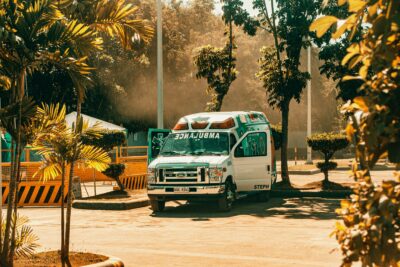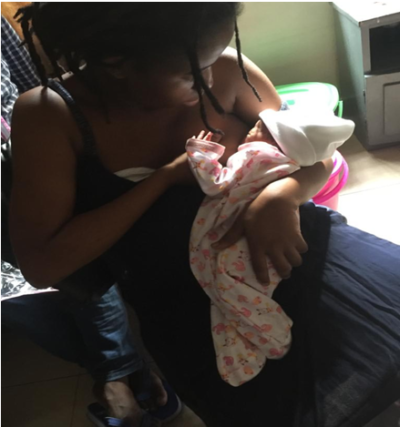A few weeks before her due date, Gloria Nalwoga watched a TV report featuring a story of a mother who had died while walking to hospital during the COVID – 19 lockdown. Her heart went out to the woman and all the other disadvantaged expectant mothers living in rural Uganda unable to access proper transportation services like ambulances and cabs.
Living in the capital city of Kampala, she never imagined that she too could face the same fate. Gloria was due to have her baby on April 27th, 2020. With Covid-19 already a reality then, she planned her life to the T and planned to be in the hospital a day before delivery.

Ambulance. Photo Ian Panelo,Pexels.
As fate would have it, this was not to be, on April 24th, she went into labour. Initially, Gloria was unaware she was in labour, having delivered her first child through cesarean section. However, she and her husband soon realised that the frequent bathroom trips and pain were not to be ignored. “Towards midnight, I felt a pang of pains like never before. I called my doctor at St Catherine hospital on Buganda Road who instructed that I immediately get to the hospital,” shares Gloria.
Since it was late and a time of COVID – 19 lockdown, Gloria could not get a cab or take public transport. She was confident that the numbers shared by the government in the media to access an ambulance in case of emergencies would work. “My husband called. It kept ringing but no responses,” Gloria says clearly still shaken by the experience.
Her husband then called a friend who shared contacts to a nearby police station and the deputy police commander. Unfortunately, all efforts to get help from the area Resident District Commissioner (RDC) who was put in charge of emergencies were fruitless as phone calls went unanswered.
Resignedly, Gloria suggested that her husband talks to the village Secretary of Defense (Nansana B 1), who referred them to the Chairperson, who happened to be their landlady. None of them could offer any help and instead kept referring them back to the RDC.

Ugandan Police tanker. Photo Maxim Moiseenko, Pixabay.
Friends could not come to their aid either for fear of encountering security personnel without car stickers, given the curfew restrictions and harsh security treatment of suspected defaulters. With the pains intensifying and running out of options, Gloria and her husband decided to walk to the hospital. All the while, she hoped that they would meet a good Samaritan to take them to the hospital.
“Thirty minutes into our journey, a police patrol drove past us. I tried to flag them down in vain”
Gloria went on to elaborate how this went on several times with all the cars passing them without a backward glance. “I soon started to panic. My legs trembled as tears rolled down my cheeks,” she continues. Luckily at that moment, a minibus heading in a different direction to the hospital agreed to drop them part of the way after pleas from the passengers.
When they were dropped off, they managed to catch the eye of a motorcyclist who despite not having official papers to travel at night offered to take Gloria to hospital. “You sit and we leave the rest to God” Gloria quotes the motorcyclist as saying.

Gloria feeding her newborn baby at St. Catherine Hospital in Kampala, Uganda. Photo Courtesy.
“He was a brave rider who didn’t care about the roadblocks. He defied several of them until we got to the hospital. He gave us his number, and asked us to pay him when the baby had been delivered and we were fully settled,” Gloria recounts. Thankfully as soon as they arrived in the hospital, she was admitted immediately and soon gave birth to a baby girl. Gloria considers herself lucky but that is not the case for many mothers. She says there is a need for flexibility around government rules in cases of emergencies’ especially for those not fortunate enough to have cars.

A happier Gloria one month after delivering the baby. Photo Courtesy.
Gloria and her husband, also recommend that in the event of any lockdown measures in future, responsibilities should be assigned to offices, not individuals. As individuals could be overwhelmed by emergencies and may not be able to respond to late calls at midnight. Gloria believes that if proper structures are instituted, there would have been different individuals working at different times regardless of time and number of cases.
Read More – Covid-19 Impact stories from Uganda and Nigeria.
Of E-Agribusiness opportunities and unlawful evictions.
Exploring Mobile Apps for Business during Lockdown.
Business Post Covid-19: Bringing women’s voices to the centre.
Not business as usual post COVID-19: Bringing women’s voices to the centre.










 The Trust supports and mobilises civil society networks on issues of ending child marriage, ending violence against children, ending female genital mutilation and promoting children’s rights, to carry out advocacy and action across Africa. Special focus is placed on Malawi, Mozambique, Tanzania and Zambia where child marriage continues to be a problem largely driven by poverty, gender inequality, harmful traditional practices, conflict, low levels of literacy, limited opportunities for girls and weak or non-existent protective and preventive legal frameworks.
The Trust supports and mobilises civil society networks on issues of ending child marriage, ending violence against children, ending female genital mutilation and promoting children’s rights, to carry out advocacy and action across Africa. Special focus is placed on Malawi, Mozambique, Tanzania and Zambia where child marriage continues to be a problem largely driven by poverty, gender inequality, harmful traditional practices, conflict, low levels of literacy, limited opportunities for girls and weak or non-existent protective and preventive legal frameworks.




 Education is a fundamental right for all children, which is also a vehicle for social, economic and political transformation in communities, countries and the African continent at large. Recent studies indicate a lack of progress in some of the critical commitments aimed at improving education quality, access, retention and achievement, particularly for girls. In most African countries, girls may face barriers to learning, especially when they reach post-primary levels of education. By implementing multi-dimensional approaches to education which includes core education, personal development, life skills and economic competencies, the Trust partners with funding partners, governments, civil societies and the private sector to improve education access.
Education is a fundamental right for all children, which is also a vehicle for social, economic and political transformation in communities, countries and the African continent at large. Recent studies indicate a lack of progress in some of the critical commitments aimed at improving education quality, access, retention and achievement, particularly for girls. In most African countries, girls may face barriers to learning, especially when they reach post-primary levels of education. By implementing multi-dimensional approaches to education which includes core education, personal development, life skills and economic competencies, the Trust partners with funding partners, governments, civil societies and the private sector to improve education access.

 The Nutrition and Reproductive, Maternal, New-born, Child and Adolescent Health and Nutrition, (RMNCAH+N) of the Children’s Rights and Development Programme aims at promoting the Global Strategy for women, children and adolescents’ health within the Sustainable Development Goals (SDG) agenda. The strategy emphasises on the importance of effective country leadership as a common factor across countries making progress in improving the health of women, children and adolescents.
The Nutrition and Reproductive, Maternal, New-born, Child and Adolescent Health and Nutrition, (RMNCAH+N) of the Children’s Rights and Development Programme aims at promoting the Global Strategy for women, children and adolescents’ health within the Sustainable Development Goals (SDG) agenda. The strategy emphasises on the importance of effective country leadership as a common factor across countries making progress in improving the health of women, children and adolescents. Through its Early Childhood Development (ECD) plan, The Trust will seek to put into action the new science and evidence Report that was presented by Lancet Series on Good and early development – the right of every child. This will be achieved by mobilising like-minded partners to contribute in the new science and evidence to reach all young children with ECD. The Trust’s goal is to be a catalyst for doing things differently, in particular, to rid fragmentation and lack of coordination across ECD sectors. In response to evidence showing the importance of political will in turning the tide against the current poor access and quality of ECD. Even before conception, starting with a mother’s health and social economic conditions, the early years of a child’s life form a fundamental foundation that determines whether a child will survive and thrive optimally.
Through its Early Childhood Development (ECD) plan, The Trust will seek to put into action the new science and evidence Report that was presented by Lancet Series on Good and early development – the right of every child. This will be achieved by mobilising like-minded partners to contribute in the new science and evidence to reach all young children with ECD. The Trust’s goal is to be a catalyst for doing things differently, in particular, to rid fragmentation and lack of coordination across ECD sectors. In response to evidence showing the importance of political will in turning the tide against the current poor access and quality of ECD. Even before conception, starting with a mother’s health and social economic conditions, the early years of a child’s life form a fundamental foundation that determines whether a child will survive and thrive optimally.